#Louisa May
Explore tagged Tumblr posts
Text














July 13, 1985 - Chrissie Mullen May and baby Louisa May, Brian May's wife and daughter, can be seen onstage during the "Live Aid" concert finale, where big stars such as George Michael, Freddie Mercury, Paul McCartney, David Bowie and Bono, sang "Do They Know it's Christmas?".
Live Aid was a multi-venue benefit concert held on Saturday 13 July 1985, as well as a music-based fundraising initiative. The original event was organised by Bob Geldof and Midge Ure to raise further funds for relief of the 1983–1985 famine in Ethiopia, a movement that started with the release of the successful charity single "Do They Know It's Christmas?" in December 1984. Billed as the "global jukebox", Live Aid was held simultaneously at Wembley Stadium in London, attended by about 72,000 people, and John F. Kennedy Stadium in Philadelphia, attended by 89,484 people.
On the same day, concerts inspired by the initiative were held in other countries, such as the Soviet Union, Canada, Japan, Yugoslavia, Austria, Australia, and West Germany. It was one of the largest satellite link-ups and television broadcasts of all time; an estimated audience of 1.9 billion, in 150 nations, watched the live broadcast, nearly 40 percent of the world population.
#Chrissie Mullen#Chrissie Mullen May#Chrissie May#Louisa May#Live Aid#1985#1985 Chrissie#1980s#1980s Chrissie#George Michael#Paul McCartney#Freddie Mercury#Bono#David Bowie#muse#Bob Geldof#Howard Jones
25 notes
·
View notes
Text
instagram
This is so adorable
#stop it I love him so much#this is so adorable#daddy bri in action#louisa may#brian may#old bri#Instagram
22 notes
·
View notes
Text
instagram
#Brian May#my guitar god love#Louisa May#Brian's animated fish!#Louisa's is in the last 'slide'#she says something but I can't quite catch it ''Dad you have to be..." ???#this is neat...I love his fish <3<3<3#Instagram
13 notes
·
View notes
Text

Brian May with daughter Louisa.
6 notes
·
View notes
Text

...I think she had a good time yesterday? Not quite sure.
2 notes
·
View notes
Audio
screaming and crying rn
Brian, before Love Of My Life: “We don’t usually make dedications, as those of you who see us every night know, but we’d like to dedicate this just once to all of you who have sweated long and hard to get here and see us. I hope it’s worth it.” He then acknowledges his daughter who is on hand to see the band for the first time. “I’d like to dedicate this to someone else too. It’s a little lady with very big eyes and blonde hair and only three years old. Louisa May, this is for you.” Brian plays a bit of Brahms’ Lullaby for her during the interlude.
London - September 7, 1984 - (x)
128 notes
·
View notes
Text



LITTLE WOMEN (1994) dir. GILLIAN ARMSTRONG
#perioddramaedit#little women#little women 1994#louisa may alcott#weloveperioddrama#filmedit#littlewomenedit#periodedit#perioddramacentral#jo march#winona ryder#kirsten dunst#userbbelcher#filmgifs#chewieblog#adaptationsdaily#cinemapix#cinematv#period drama#*gifs#*gifset#userrias#userrias gifs#nostalgiatvdaily
792 notes
·
View notes
Text
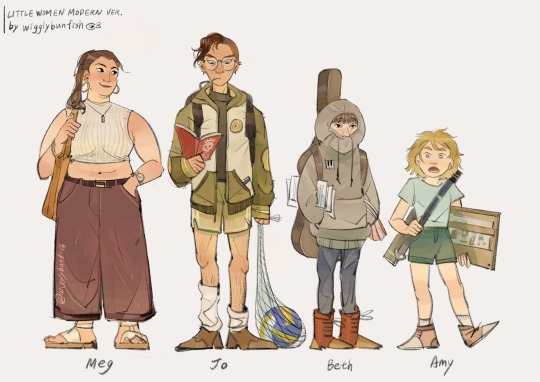
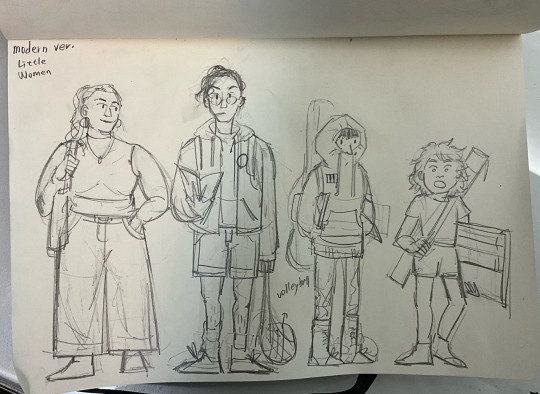
Been rereading Little Women recently... or technically, properly reading it for the first time. The last time I touched this book was when I was ten, and the book I touched was a shortened chinese edition (or was it just the first half? anyway) Here are the sisters in 21 century post covid and I think Beth would've loved the groundbreaking invention that is the Hoodie
#i know she plays the piano guys. i read the book#just need to give her smth to carry and decided fuck it my girl knows her strings. piano is part string certainly this isn't a stretch#<- just didn't want to draw keys#behold. you can't tell me jo wouldn't jump at the chance to hack her hair off. she's dyke now deal with it#jo is also a jocky nerd btw#amy's stuff is just what i carry on a weekly basis. go amy#me adding jewelry to meg's fit: heeheehoohoo#art#illustration#character design#artist on tumblr#little women#louisa may alcott#little women fanart#character illustration#character art#meg march#jo march#beth march#amy march#wigglybunfish
992 notes
·
View notes
Text
Movie of a centuries-old novel: since the novel has ProBlEmaAtIc elements, we will rewrite it to make it more appealing for our modern audience!
Me: then how did you end up being even less progressive and feminist than the original source? And you missed the point the author was trying to make too!
Movie of a centuries-old novel: we have sassy and tomboyish female characters, what are you talking about?
#you know what I am talking about#dracula#bram stoker#Jane Austen#Mansfield park#persuasion#Louisa may Alcott#little women#crack but also text#I could go on
505 notes
·
View notes
Text
Bbc Montreux Music Festival Switzerland - 8 May 1986



#chrissie may#brian may#louisa may#jimmy may#chrissie mullen#1980s#1986#1980s chrissie#1986 chrissie#muse#chrissie mullen may
29 notes
·
View notes
Text






LITTLE WOMEN (1994)
dir. gillian armstrong
#little women 1994#louisa may alcott#costume drama#period drama#perioddramaedit#perioddramagif#onlyperioddramas#perioddramasource#weloveperioddrama#filmtvdaily#christmas#movieedit#moviegifs#filmgifs#filmedit#jo march#amy march#beth march#meg march#winona ryder#kirsten dunst#claire danes#trini alvarado#my gifs#mine
422 notes
·
View notes
Text

#oh to read these books for the first time again#little women#louisa may alcott#anne of green gables#l.m. montgomery#children's books#classic literature#books#booklr#reading#bookish#bibliophile#library#libraries#tflo#aogg#librarians
471 notes
·
View notes
Text



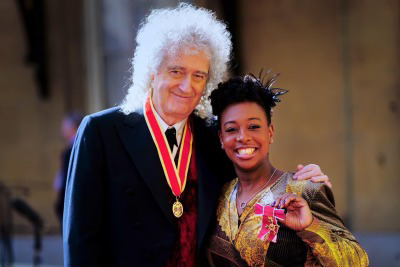
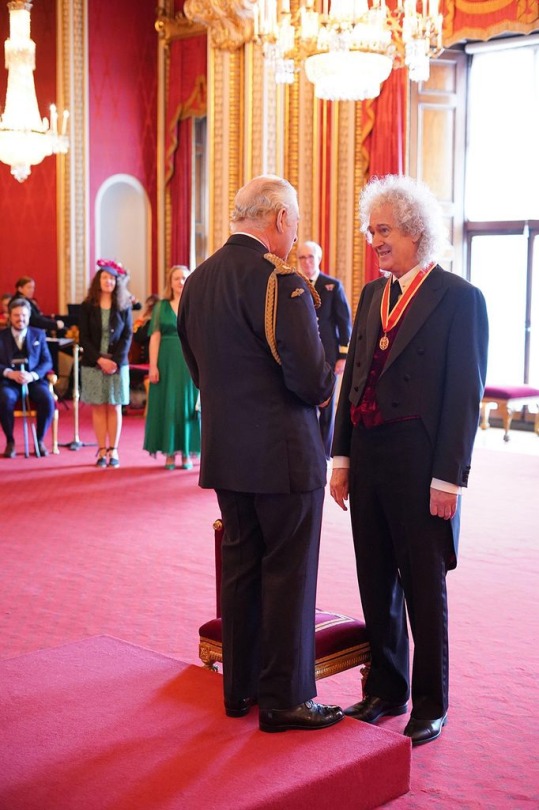



Dr Sir Brian May everyone


9 notes
·
View notes
Text
"Some books are so familiar that reading them is like being home again."
― Louisa May Alcott
#quote of the week#quote#quotations#on books#on reading#Louisa May Alcott#read#reading#reader#book blog#book blogger#Features#readers of tumblr#booklr#bookish#bookworm#book community#booklover#bookaholic#books
2K notes
·
View notes
Text
The March Sisters 📚
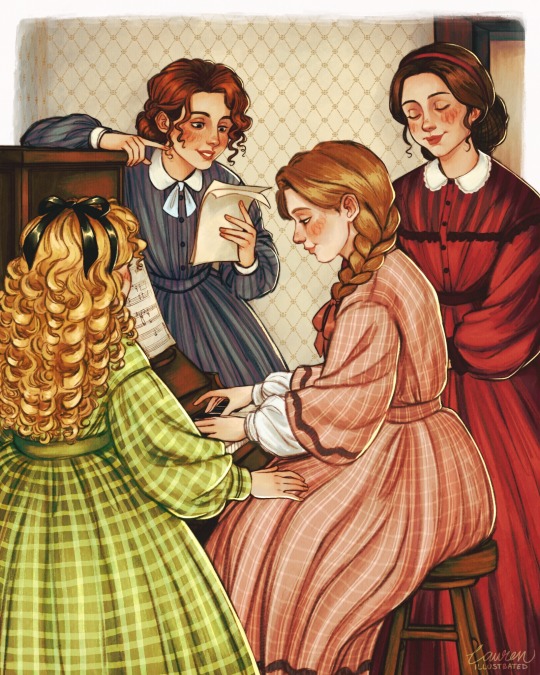
Little Women illustration based on the book!
#little women#little women book#louisa may alcott#jo march#meg march#beth march#amy march#book illustration#book illustrations#character illustration#childrens illustration#childrens literature#character art#drawing#digital drawing#illustration#digital art#illustrator#character design#drawing illustration#illustration art
3K notes
·
View notes
